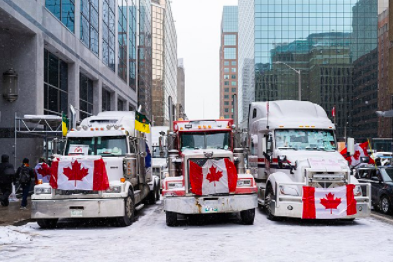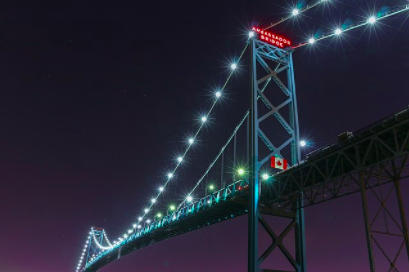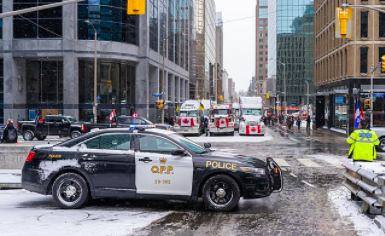The Issues Surrounding the Freedom Convoy in Canada and COVID-19 Mandates
Since the COVID-19 vaccine mandate was instituted Canada, it has caused lots of opposition from the people and especially from the truckers.

Maksim Sokolov (Maxergon), CC BY-SA 4.0, via Wikimedia Commons
This is a photo of trucks with the Canadian flag in front blocking the roads as a sign of protest against the mandate in the streets of Ottawa. There are also many cars within this line amongst the trucks which shows how united many people are regarding this issue.
Hundreds of trucks were lined up on the Ambassador Bridge, the streets of Ottawa were clogged with protestors, and police were making arrests everywhere. What had happened there?
On January 15th, 2022, Canada enacted a vaccine mandate for the trucking industry, similar to its trading partner America. The policy required that the truckers who interact with other workers be fully vaccinated against the COVID-19 virus and if not, they must be quarantined for fourteen days upon returning to Canada. There was an immediate backlash from truckers who felt that their rights were being violated, as in most cases working was necessary in order to pay for living expenses. It first began with a few truckers who would block roads and routes for trade as an act of rebellion against the government. However, as more people joined, this movement grew and was named the Freedom Convoy. But this series of protests were not the first.
In November 2021, the truckers began their protests once news spread of the possibility of a vaccine mandate. These protests were successful and seemed to have made the government drop the mandate on January 12th, 2022. However, a few days later, the Canadian government reenacted the mandate, which angered protesters once again. “I find the concerns reasonable because they may not all have a stable income outside of working as a truck driver, which is why they feel like the mandate which may have them take some time off is unreasonable,” said Lilly Lin ’22.
The majority opinion from the truckers was that it should be their choice on whether they should be vaccinated or not, and that the government putting their jobs on the line and disregarding their opinions is not right. One of the main groups behind this protest is Canada Unity which claimed that this law was “unconstitutional.” These truckers account for two-thirds of the $521 billion trade between Canada and America, but the Canadian Trucking Alliance (CTA) estimates that due to this mandate, about twenty percent of truckers may be laid off.
Protests first took off on February 6th, 2022, when truckers blocked the Ambassador Bridge as a sign of rebellion. The bridge accounts for one-fourth of the trade between America and Canada, which is why this move required the Canadian government’s quick response. Prime Minister Justin Trudeau deemed that police needed to become involved, and on February 13th, police began to make arrests and towing the trucks off of the bridge. Hannah Lee ’23 said, “I think that it was necessary for the police to become involved because the bridge is the source of a lot of money in both countries, and it could have severe economical impacts if the blockade wasn’t removed quickly.”

Yet, this was not the biggest problem. The protest had garnered support from not only truckers but also from other Canadian citizens. Around the same time as the blockade on the bridge began, cars and trucks began to block the streets of Ottawa. Protesters parked their vehicles in the streets and held up signs with the words “Liberté” or “Freedom” and chanted for their rights.

Trudeau responded by invoking the Emergency Powers Act which received a lot of criticism. This Act can only be invoked when there is a serious issue that threatens the ability of the Canadian Government to preserve the sovereignty, security, and territorial integrity of the country and cannot be dealt with using laws already in place. Using this power, Trudeau has been freezing the bank accounts of not only the trucker’s and corporate bank accounts, but also the bank accounts of any other persons found guilty of participating in the protest. He stated that he will take further action to punish those who continue to protest by limiting their financial support and livelihood.
Deputy Prime Minister Chrystia Preeland told the Freedom Convoy Members to “Consider yourselves warned,” and “If your truck is used in these blockades, your corporate accounts will be frozen. The insurance on your vehicle will be suspended. Send your rigs home.” Those that criticized the government for being too hesitant in responding have praised this course of action while others felt that this was a violation of the truckers democratic rights and should never have been allowed.

The Freedom Convoy movement had also expanded to thirty-four other countries — including America, Argentina, New Zealand, Austria, and more — and inspired their own respective Freedom Convoy movements. Most notably, a group of truckers in the United States called the “People’s Convoy” began a solidarity protest from California to Washington D.C. on February 23rd, 2022. These people were also protesting against the vaccine mandate for tuckers in America. The Pentagon allowed for the deployment of 700 unarmed National Guard troops to D.C., but only a small number of protestors arrived from California.
When asked about the potential success of this movement, Alma Arazi ‘24 said, “I think that eventually the government will give in because as time goes on, this movement will only grow bigger, which will have even more negative impacts on the country.” Although the movement in Canada as well as other countries has settled down, the core problem is far from over.
“I find the concerns reasonable because they may not all have a stable income outside of working as a truck driver which is why they feel like the mandate which may have them take some time off is unreasonable,” said Lilly Lin ’22.
Sydney Lee is a Copy Chief for ‘The Science Survey.' She finds journalistic writing very interesting because of the variety of topics that it can cover....










